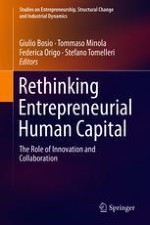2018 | OriginalPaper | Chapter
What Happened Next? A Follow-Up Study of the Long-Term Relevance and Impact of a Collaborative Research Project
Author : Stefano Cirella
Published in: Rethinking Entrepreneurial Human Capital
Publisher: Springer International Publishing
Activate our intelligent search to find suitable subject content or patents.
Select sections of text to find matching patents with Artificial Intelligence. powered by
Select sections of text to find additional relevant content using AI-assisted search. powered by
